Special Needs Parents and Trauma: Medically Induced PTSD
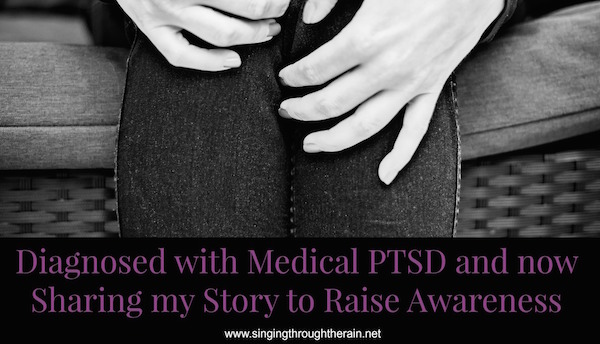
Today, Different Dream is wrapping up its ongoing series about PTSD in parents of kids with special needs. Guest blogger Kathryn Sneed is here to share her story of medically-induced PTSD. Perhaps you will see yourself in what she has to say.
Sharing my Story to Raise Awareness about Special Needs Parents and Trauma
Ever since I was diagnosed with medical-related PTSD, I’ve been afraid to tell my story. I’ve been afraid of people’s thoughts and knew that a lot of people would have a hard time understanding.
In the military community, PTSD is a very serious thing. Since I partly write a military blog, I wasn’t sure how my writing about this topic would be taken. I definitely don’t want my topic to shadow the importance of combat-related PTSD and the public’s knowledge and awareness of it.
On the other hand, medical-related PTSD is very real and very unknown to the public. I knew I had to share my story so that I could bring anybody awareness and hopefully to help others who may have gone through the same thing. This is a very tough topic for me and it’s been very hard, but also cathartic for me to write about.
The first part of this story was birth trauma during my son’s birth. If you missed that part be sure and go back and read it first. That birth trauma was just a small part of the entire story that led to me being diagnosed with medical-related PTSD earlier this year. This is the second part of my story.
Special Needs Caregiver Trauma: Autism
The anxiety that came with the birth of my son only continued to grow as he got older. He’d had problems since birth that no doctor would acknowledge, but things had gotten worse during my husband’s deployment. During that time we were told that my son most likely had autism.
While we were waiting on a diagnosis, many other medical tests were done to rule things out. My son also ended up in the hospital during this time. He had been very sick for weeks and was dehydrated. One Sunday night we ended up in the emergency room. He needed IV fluids, but it wasn’t as easy as that. He wasn’t going to let anyone touch him.
They told me they would have to wrap him up in a sheet so that he couldn’t fight as much. This would help them get the IV in. Because he was so dehydrated, it took more then 30 minutes to get the IV in. Two nurses worked on getting the IV in his arm, my friend was helping hold his upper body still, and I was holding down his still-kicking legs. In spite of our efforts he continued to fight, scream, and cry. It was awful as I held him down and tried to keep the tears that I too had from falling.
As he continued to need more medical tests, it only got worse. It always started with three or four doctors and nurses trying to keep him calm, and me helpless to do anything to make it better. For one of these tests they needed to put him under. We were allowed to stay in the room during this time, but I wish we hadn’t been.
They gave him the medicine and he should have been asleep, but he was still fighting. Screaming. Crying. Needing me, his mom. The doctor told the nurse he needed more medicine to put him to sleep, and at that point I couldn’t stay and watch anymore, I left the room in tears.
Things got a little better as my son got older. He had been officially diagnosed with autism and was in all kind of therapies and interventions. The stress was hard though as we had a rigorous schedule, and the ups and downs of therapists coming and going left me in tears more often then naught.
By this point, I realized I needed to be on medicine for anxiety. I had been in counseling for awhile and we had talked about the help the medicine would bring. It was a welcome reprieve.
Years later as the things got better with my son, we decided to have another baby. We knew that there was a chance that baby could also have autism, but we never imagined the medical complexities we would face with our second child.
Special Needs Parents and Trauma: Medical Complexities
Soon after my daughter was born we discovered she had severe reflux. Projectile vomiting was a common occurrence every day and so was choking during her bottle feedings. By the time she was two months old, we discovered things were much worse then we thought. She had several tests and we heard words like Failure to Thrive, Laryngomalacia, and Aspiration.
We were told that she wasn’t gaining weight, that when she was being fed she was aspirating on her food (it was going into her lungs) and causing her to choke. Because she had severe reflux she was also aspirating on the reflux that was coming back up. Multiple times a day she was choking and there was nothing we could do, but make sure she was propped up.
Soon she was admitted to the hospital. More testing, a feeding tube through the nose, and wires everywhere. We were sent home after a week, but we didn’t even make it 24 hours before she was admitted again, this time for surgery. They did two surgeries at the same time, a Fundoplication and a feeding tube that was inserted into the stomach. Letting my three month old baby go with those doctors for surgery was the hardest thing I’ve ever done.
Only two weeks after we got home from the hospital, she was admitted again, this time in Atlanta. She had been having what seemed like choking spells every day since we left the hospital. It all came to a head when she started turning beet red and looked like she couldn’t breathe.
By this point my nerves were shot. During one of the hospital stays I had called my doctor and told her I needed to go up on my anxiety medicine. I knew I wasn’t handling things well and I needed help. I was barely sleeping for fear she would choke and die in her sleep. Every cough, every weird breath had me running in to check on her during the night, multiple times a night.
We spent two weeks in the hospital in Atlanta. They ran every test the doctors could think of and even some that I thought of. After two weeks of testing the only thing they were able to find was central and obstructive apnea. Other than that, they weren’t sure why she was having these “choking” episodes or why she was struggling to gain weight even with the feeding tube.
The hospital has us take a CPR class to learn what to do for the choking episodes and then sent us on our way. They told us there was not much we could do and that as long she wasn’t turning blue she was fine. But the episodes continued up to 20 times a day.
As the months went on, things got worse and finally we decided to go to Boston to get more testing and another medical opinion. Hospital stay after hospital stay came and went. Different hospitals every time. Sometimes it was because she was so sick, other times it was for IV antibiotics. By the end of the year, she had been hospitalized a total of 7 times not including emergency room visits, and had spent over 7 weeks total in the hospital.
As more tests came and went, I began to grow numb. The doctors and nurses would tell me they were surprised I wasn’t crying and they didn’t know how I was so calm. I didn’t have time to cry, I had to be strong for my baby. I wasn’t calm, on the inside the storm was raging and the numbness just grew.
The anxiety was severe. Any sign of sickness in my kids sent me into a panic attack for thought of something serious and having to stay in the hospital again. The obsession with finding answers had grown. I spent hours and hours on the internet searching for answers. Something, anything that would explain what was going on with my daughter.
Although the choking episodes had gotten better and were almost non-existent, coughing or choking of any kind in child or adult, would send me into a panic. It was like being slammed in the face with everything we had been through with my daughter.
A friend’s child would choke a little on her food, and I would freak out. On the inside it was even worse. I would wonder why no one was doing anything, why everyone was so calm. A child was choking. But when I came out of the haze, I looked around I realized that what I had thought was choking was just a little cough to clear the food or just a little water going down the wrong pipe.
I would have flashbacks watching shows that had a child in the hospital or going into surgery, and I would have to change the show before I had a full blown panic attack. I would have nightmares about people choking. Just choking over and over and nothing could stop it.
Almost nightly I was having panic attacks and unable to sleep. The sleep medicines the doctors gave me did nothing to help. I started having chest pains and several times I almost went to the hospital thinking I was having a heart attack. I finally realized I needed help and went to see my doctor who again upped my anxiety medicine.
Finally, I mentioned to my counselor what was going on. She told me that what I was experiencing was symptoms of PTSD. In a way, I wasn’t surprised. I knew this was more severe then a little anxiety.
Everything came to a head when we received three month’s notice that we were moving across the country. We still had not found answers, I still had two kids in therapy and a daughter who was at the time seeing 6 different specialists. The stress was enormous.
The week before the movers came, I literally started losing it. The stress of moving plus dealing with several infections in my daughter that were not responding to antibiotics. I felt like I was having a breakdown, I was having severe panic attacks and it was so bad that I almost took myself to the hospital to ask for help and relief.
I finally ended up at the doctor’s office, sitting in the chair shaking uncontrollably from the anxiety I was feeling. The doctor decided to put me on something a different. It was a lot stronger then anything I had taken before and I’m still on it today. It’s helped more than I can say, and I am thankful that I was able to re-gain some control.
Before we moved. My counselor told me to seek out someone here that knew how to do EMDR therapy. I’m happy to say that I have found a good Christian counselor who is trained in EMDR and she wants to start the therapy with me this summer. I’m excited to see how it’s going to help and how hopefully it will change my life.
I share my story to raise awareness. Combat-related PTSD it not the only type of PTSD that exists. Caregiver trauma and PTSD due to caring for children that have special needs is real.
Learn More about Special Needs Trauma and Parents
You can learn more about special needs trauma and parents at Kathryn’s blog Singing Through the Rain. To read other posts in the series about special needs trauma and parents, check out the links below:
Part 2: Special Needs Parents and PTSD–What About You Mom?
Part 5: PTSD in Parents–Moving from Negative to Positive
Part 7: PTSD in Parents of Kids with Special Needs: Visualization as a Coping Tool
Part 8: Newborns Feel Pain: The Headline that Almost Triggered My PTSD
Part 9: Why Special Needs Parents with PTSD Should Watch Inside Out
Part 11: PTSD and Special Needs Parents: Calling it Like It Is
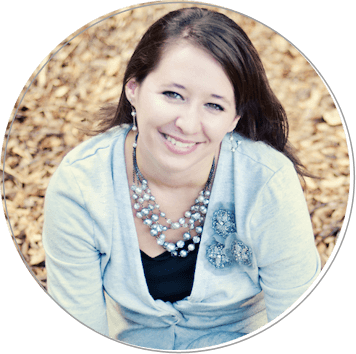
By Kathryn Sneed
Kathryn is the sole owner and blogger of Singing Through the Rain. She is a 30-something, coffee-obsessed wife and mom trying to raise her two kids and a service dog, while navigating their special needs and chronic illnesses!
4 Comments
Trackbacks/Pingbacks
- Special Needs Parenting, Trauma, & PTSD | Special Connections - […] https://differentdream.com/2015/06/special-needs-parents-and-trauma-medically-induced-ptsd/ […]
Submit a Comment
Subscribe for Updates from Jolene
Related Posts
PTSD and Special Needs Parents: 5 Ways to Prepare for Healing
Special needs parents are at risk of developing PTSD. Brandy Brow offers hope and five practical ways to prepare for the healing that will come slowly.
PTSD in Parents: Moving from Negative to Positive
PTSD in parents has a long shelf life as guest blogger Kathy Guzzo reveals. She also offers advice about how to turn the negatives of PTSD into positives.
8 Truths about PTSD in Parents of Kids with Special Needs
These 8 truths about PTSD in parents of kids with special needs from Barb Dittrich offer practical advice and encouragement to families.



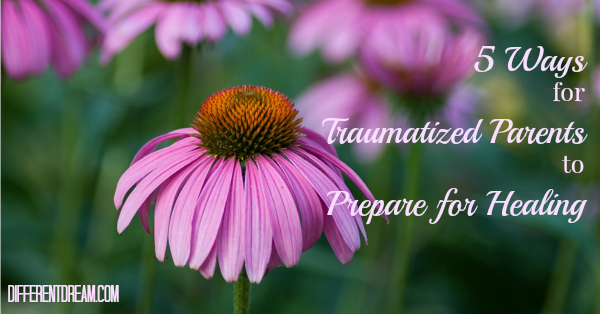
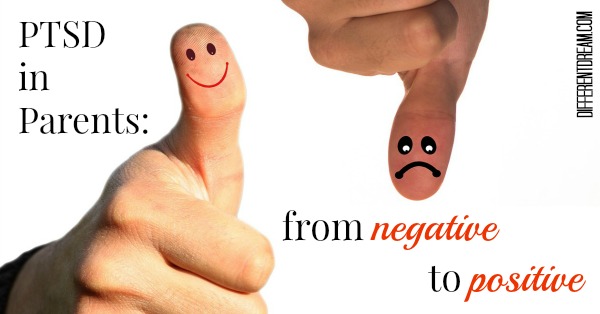
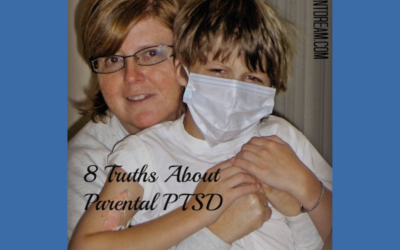
Andi, I’m not surprised that your dad’s illness is causing anxiety, considering what you’ve experienced with your children. As you said, it is a real thing, and while your anxiety hasn’t reached the level described in this post (and that’s good to hear), it is good that you are acknowledging it. Perhaps you would be wise to practice some preventative medicine and meet with a therapist. A good therapist will listen to what you’re dealing with and help you develop some coping skills. Praying for you!
I believe with all of my heart this is a real thing! I read “Anchored” by Kayla Aimee last year, and as much as I enjoyed the book and could relate to it, I had to put it down several times to allow myself to recover a little. At the time, I told my husband that I felt like I was having a PTSD experience, reliving our own daughter’s NICU stay. Fast forward to now: despite having two special needs children, I’ve always managed pretty well, but my dad was diagnosed earlier this year with an incurable brain tumor. I am his only child, so now I’m dealing not only with that but my two children’s needs (and the older one is now a teenager, which comes with it’s own set of challenges). I don’t believe I’m to the level described above, but I have experienced periodic anxiety over the past few months that I’ve never had before.
You are so welcome, Julie! I’m glad this post helped you identify what you’re dealing with. Your PTSD is as real as what combat vets experience. And it’s every bit as treatable once you know what you’re dealing with. Jolene
I can’t thank you enough for this post. After several years of my kids not needing much medical intervention, it appears that we need to head that route again. I instantly felt something rush over my brain and I could no longer think. My heart started racing, and I couldn’t breathe. I couldn’t make decisions or make any sense at all. This was a couple hours ago.
I do see a doctor for depression and anxiety. I’m glad to know that I’m not the only one who feels like this at times. I have wondered if it’s PTSD as well, but reluctant to call it that too. After all, like you, I live in a safe place, have never been in combat, and don’t have a family member in combat. Nonetheless…I believe this exists, and I think you for sharing this.